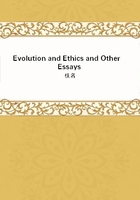
第13章
I see no reason to doubt that, at its origin, human society was as much a product of organic necessity as that of the bees.The human family, to begin with, rested upon exactly the same conditions as those which gave rise to similar associations among animals lower in the scale.
Further, it is easy to see that every increase in the duration of the family ties, with the resulting co-operation of a larger and larger number of descendants for protection and defence, would give the families in which such modification took place a distinct advantage over the others. And, as in the hive, the progressive limitation of the struggle for existence between the members of the family would involve increasing efficiency as regards outside competition.
But there is this vast and fundamental difference between bee society and human society. In the former, the members of the society are each organically predestined to the performance of one particular class of functions only. If they were endowed with desires, each could desire to perform none but those offices for which its organization specially fits it; and which, in view of the good of the whole, it is proper it should do. So long as a new queen does not make her appearance, rivalries, and competition are absent from the bee polity.
Collected Essays, vol v., Prologue, pp. 50-54, Among mankind, on the contrary, there is no such predestination to a sharply defined place in the social organism. However much men may differ in the quality of their intellects, the intensity of their passions, and the delicacy of their sensations, it cannot be said that one is fitted by his organization to be an agricultural labourer and nothing else, and another to be a landowner and nothing else.
Moreover, with all their enormous differences in natural endowment, men agree in one thing, and that is their innate desire to enjoy the pleasures and to escape the pains of life; and, in short, to do nothing but that which it pleases them to do, without the least reference to the welfare of the society into which they are born. That is their inheritance (the reality at the bottom of the doctrine of original sin) from the long series of ancestors, human and semi-human and brutal, in whom the strength of this innate tendency to self-assertion was the condition of victory in the struggle for existence. That is the reason of the aviditas vitae--the insatiable hunger for enjoyment--of all mankind, which is one of the essential conditions of success in the war with the state of nature outside; and yet the sure agent of the destruction of society if allowed free play within.
See below. Romanes' Lecture, note 7.